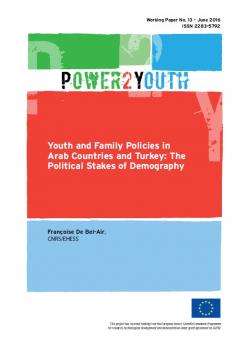Youth and Family Policies in Arab Countries and Turkey: The Political Stakes of Demography
The aim of the paper is to analyse the dominant trends of demographic evolution in South and East Mediterranean (SEM) countries since the 1960s and 1970s, as well as the evolution of demographic policies and popular debates surrounding the shift. It seeks to highlight from these two sources the deep socio-demographic rifts dividing youth and societies in the SEM countries today, in the mid-2010s. Additionally, it attempts to pinpoint how reforms (or attempts at reform) of family law actually reflect the goals and stakes of “high politics,” regarding the role of youth as agents in the reproduction of socio-political structures.
-
Details
Roma, IAI, June 2016, 53 p. -
Issue
13
Introduction
1. Family Dynamics, Contrasted Trends
1.1 Evolution of Family Structures from the 1960s to the 2000s
1.2 The 2000s-2010s: Reversing Trends?
1.3 The Proximate Determinants to Family Formation Patterns: Divided Youth?
2. Family and the Nation-Building Processes: Family Policies from the 1960s to the 2000s
3. The 2000s and Beyond: Family Policies at the Heart of the Political Struggle
4. Contrasted Policies, Divided Polities: Analysing Policy Representations of Youth
4.1 Number: Youth as Agents of Production and Reproduction of Family Units
4.2 Structure: Youth as an Agent of Reproduction of the Structures of Domination and Protection within the Family
4.3 Dynamics: Youth as an Agent of Reproduction of Social Values and Identity
5. Family Policies as Biopolitics: Converging Towards a New Kind of “Neoliberal Neopatriarchal” Society?
5.1 Family, Population and Politics
5.2 Neo-authoritarianism and the Reshuffling of Neopatriarchy: Youth as Subjects
5.3 Neoliberal Policies and the Sustainable Family: Youth as a Commodity
5.4 Muslim vs. Non-Muslim Family: Youth as the Guardian of Cultural Distinction
Conclusion
References
Topic
Tag
Related content
-
Ricerca08/10/2014
POWER2YOUTH - Freedom, dignity and justice
leggi tutto



